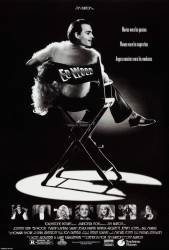
Question: Does anyone know why this is the only Tim Burton film for which Danny Elfman hasn't written the score? All I can think is that time-wise it might have clashed with Black Beauty, but I'd like to know a definite reason.
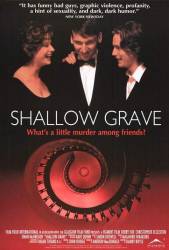
Question: Is removing hands, feet and teeth really sufficient to prevent the corpses being identified? What about DNA?
Answer: Even with head, hands and feet removed, a lot about a person's identity can be determined from body scars, tattoos, body tissue and blood samples, etc. Sex, age, height, weight, body-fat content, race, hair color, and pre-death physical health can all be determined rather easily through traditional means, even given only a torso for examination. Once investigators have a general idea of identity, they can compare their findings to a missing persons database and narrow it down further to likely matches. Then they can request DNA samples from the families of likely missing persons and compare it to the DNA of the corpse. Of course, if the corpse was never reported as missing, that would bring the investigation to a dead-end.
Answer: Identifying a body (or anyone for that matter) through DNA would only work if that person's DNA is already on file and you had something to compare it to (and getting a DNA match is an extensive process that doesn't happen over night despite what some TV shows suggest). I don't know about the UK, but in the US, federal DNA databases didn't really start until 1994. And only a few states started a felon DNA database in the 90's, so it's unlikely Hugo's DNA was on file. It's much more likely that a person's fingerprints or dental records were on file since they were much more common and not exclusive to felons. Again though, those records would have to be on file in order to compare to a body. I don't know if the feet removal was more for the dark comedy aspect or if they thought his feet print were on file and would be viable (i.e. prints taken when he was born in the hospital).
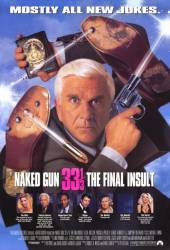
Question: Were any of O.J. Simpson's scenes cut due to his then-impending murder trial?
Answer: According to the IMDB, the only scene cut out was an extended version of Norberg and Ed's visiting Dreben near the beginning of the film. So you can assume the rest of Simpson's scenes were left in.
Answer: O.J. Simpson's murder trial wasn't then pending. This movie came out on March 18, 1994. Nicole Brown Simpson and Ronald Goldman were murdered on June 12, 1994. In fact, O.J., Nicole and their kids attended the premiere of Naked Gun 33 1/3 together.
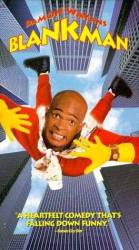
Question: Arsenio Hall is credited for starring in this film. When does he appear and what character does he play? I have seen this movie multiple times and don't recall ever seeing him in it.
Chosen answer: He filmed a fake episode of his talk show for the film. You can see Kevin watching it (it has superheroes Gay Man and Midget Man).
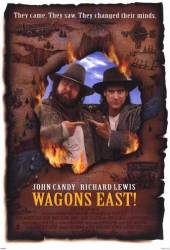
Question: At the end, after the Indians leave and Harlow says "Wagons ho", when the wagons are moving, there's a stool thrown into the field from the left of the screen (in my viewing thrown from off-camera). Was there a joke I missed or does someone know who threw it and why?
Answer: It appears to be a woman standing up and reaching for something in her wagon. As the camera pans away, this stool can be seen thrown and landing - breaking apart.
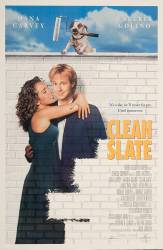
Question: What happens to Hendrix and Dr Hoover? They were never seen again since they both tied up by Cornell and his henchmen but what does Cornell means "Not on the rug"?
Answer: Hendricks and Dr Hoover were killed, when Cornell says, "not on the rug" he means don't kill them on the rug, it will be messy. The rug was most likely an antique.
Why was that a reward though for Hendricks. It wasn't his rug.
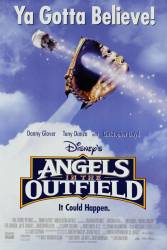
Question: At the end of the movie George Knox adopts PJ, and Roger. Wouldn't George have had to meet with a social worker before adopting them?
Answer: Maybe he did offscreen?
I meant that as a yes or no question.
Then that answers the question. We also don't know WHEN he did it, so it's entirely possible that he visited with one. We also don't find out that he adopted both Roger and JP because it was supposed to be a surprise, meaning that we wouldn't find out until that moment.
It feels like the question was about the legal steps needed to take, not did he do them or not. Does an individual in his situation need to visit a social worker?
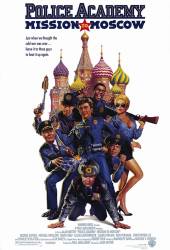
Question: Neal Israel is the writer for the film (and the series) and Richard Israel is in the film (as Adam Sharp). Are they related at all? Or is this just a coincidence of last names?
Answer: They are not related. It is a coincidence.
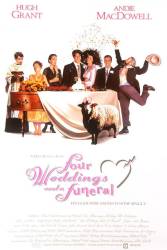
Question: Why wouldn't Charles' brother be his best man? Or is that not traditional in England the way it is in America? It's not mandatory but is certainly expected, unless the brothers are not close (which Charles and his brother are) or the groom's father serves as best man.
Answer: A groom can choose whoever he wants as best man. As you say yourself, it's by no means mandatory for it to be the groom's brother, even if they are close. In this particular case, it's possible that David felt that he ought not to be the best man, due to the difficulty that he'd have in making a speech, but, really, Charles was under no obligation to choose him.
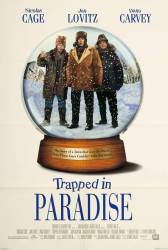
Question: When the brothers go into the bank for the first time Bill overhears the manager call Sara by her name. Bill then goes over and says "Sara? Sara Collins?" And she says yes, and later she askes Bill if they know each other. He says they do not, and she walks away. But why didn't she ask him how he knew her last name when no one told it to him at the bank?
Answer: She was busy at work and did not care how or why he knew.
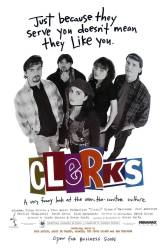
Question: Regarding the scene with the highly offended customer, is the actor deliberately hamming it up, or is he just a bad actor?
Answer: I think it's a combination of both of those. He's played by Walt Flanagan, who also plays three other characters in the movie. Flanagan was a friend of Kevin Smith who filled in for several roles. He's definitely playing the part a little hammy... but I also think some of his reactions are a little off because it was (obviously) his first film, and he was inexperienced. (Though to be fair, he appeared in similar small roles in several other Smith films, and his acting improved over time).
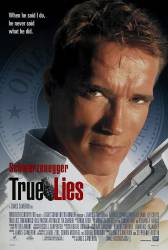
Chosen answer: According to Tim Burton in an interview at the time, they were "taking a little vacation from each other", - he also said that he was not sure what the situation between them was, which certainly implied a falling out. Danny Elfman is a bit more open, describing what happened as "a family feud" - he says that after working on six films together in ten years, they had a bit of a creative fallout, which led to Howard Shore doing the music for Ed Wood. Afterwards, according to Elfman, they realised that they missed working together and went back to collaborating happily.
Tailkinker ★